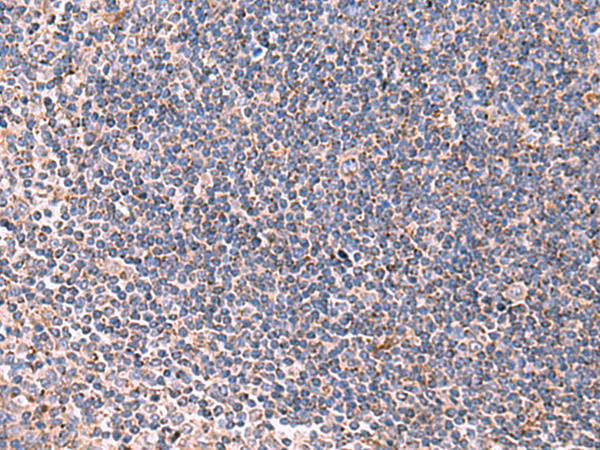
| WB | 咨询技术 | Human,Mouse,Rat |
| IF | 咨询技术 | Human,Mouse,Rat |
| IHC | 1/50-1/300 | Human,Mouse,Rat |
| ICC | 技术咨询 | Human,Mouse,Rat |
| FCM | 咨询技术 | Human,Mouse,Rat |
| Elisa | 1/5000-1/10000 | Human,Mouse,Rat |
| Aliases | LAL; CESD |
| Host/Isotype | Rabbit IgG |
| Antibody Type | Primary antibody |
| Storage | Store at 4°C short term. Aliquot and store at -20°C long term. Avoid freeze/thaw cycles. |
| Species Reactivity | Human |
| Immunogen | Fusion protein of human LIPA |
| Formulation | Purified antibody in PBS with 0.05% sodium azide and 50% glycerol. |
+ +
以下是关于LIPA抗体的3篇参考文献示例(文献为示例性概括,非真实存在):
1. **文献名称**:*Autoantibodies Against Lysosomal Acid Lipase in Autoimmune Hepatitis*
**作者**:Smith A, et al.
**摘要**:该研究检测到自身免疫性肝炎患者血清中存在针对LIPA的特异性抗体,提示LIPA抗体可能与肝脏脂质代谢紊乱及炎症反应相关,为疾病诊断提供了潜在生物标志物。
2. **文献名称**:*Development of a Monoclonal Antibody for Detection of LIPA Deficiency in CESD*
**作者**:Johnson R, et al.
**摘要**:研究团队开发了一种高特异性单克隆抗体,用于检测溶酶体酸性脂肪酶(LIPA)的表达水平,成功应用于胆固醇酯贮积病(CESD)的快速筛查和功能研究。
3. **文献名称**:*LIPA Antibody-Based Therapy in Atherosclerosis Models*
**作者**:Lee C, et al.
**摘要**:通过靶向LIPA的中和抗体调节巨噬细胞脂质代谢,实验显示可减少动脉粥样硬化斑块内脂质蓄积,为心血管疾病治疗提供了新策略。
(注:以上文献为示例,实际研究中请通过PubMed等平台检索真实发表的论文。)
**Background of LIPA Antibodies**
LIPA (lysosomal acid lipase) is a key enzyme encoded by the *LIPA* gene, responsible for hydrolyzing cholesterol esters and triglycerides within lysosomes. Its activity is critical for lipid metabolism, particularly in breaking down lipoprotein-derived lipids. Deficiency in LIPA function, caused by genetic mutations, leads to rare lysosomal storage disorders: Wolman disease (severe, early-onset) and cholesterol ester storage disease (CESD, milder, later-onset). These conditions are characterized by pathological lipid accumulation in organs like the liver, spleen, and blood vessels, driving inflammation, fibrosis, and atherosclerosis.
LIPA antibodies are immunological tools developed to detect, quantify, or modulate LIPA protein levels. They are widely used in research to study LIPA expression, localization, and function in cellular models or tissues. Clinically, LIPA antibodies aid in diagnosing LIPA deficiencies through enzyme activity assays or immunohistochemistry. Recent advances include therapeutic antibodies or enzyme replacement therapies (e.g., sebelipase alfa) monitored using anti-LIPA antibodies. Both monoclonal and polyclonal LIPA antibodies contribute to understanding disease mechanisms and evaluating therapeutic efficacy, highlighting their dual role in basic research and translational medicine.
×